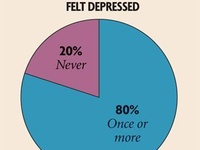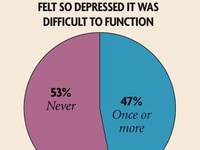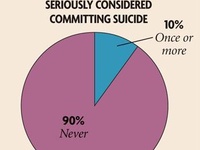About 1,800 graduates and undergraduates visit UHS Mental Health Services every year, Kadison estimates.
And about 650 undergraduates received therapy from the Bureau of Study Counsel last year, according to Director Charles P. Ducey.
The immense demand has forced the bureau—a center founded to help students adjust to college life—to morph into a nearly full-time mental health center with 13 clinicians.
But many students, like former Undergraduate Council President Rohit Chopra ’04, say that Harvard’s mental health resources are “pathetic.”
In interviews for this series, 24 students who have sought mental health treatment at Harvard described a confusing and hit-or-miss system that often failed to improve their situations.
The Crimson’s six-month investigation found:
• The high cost of trying to provide comprehensive mental health coverage to students has led Harvard to create an assembly-line approach to therapy. Students are quickly ushered in, and sometimes nudged out, of getting care. Some patients are cared for by multiple clinicians who do not communicate with each other—allowing some students’ conditions to spiral out of control as they fall between the cracks of the system.
• The decentralization of Harvard’s mental health services has led many students to get lost in the system. Unlike most universities, Harvard’s system is split between UHS and the bureau. Few students, however, know about the bureau’s therapy resources because of its heavily publicized focus on academic help.
• Mental health awareness education for residential tutors has recently been increased, but some residential tutors—supposedly the first line of defense for students with mental health problems—are failing to properly advise on how to get help. Professors and teaching fellows, the other officials closest to students, receive little to no training on how to help mentally ill students. As a result, some students do not get the mental health care that they need when they need it.
• Students with the most severe mental health problems need the most help, but some of these students feel that administrators simply try to push them off campus. When confronted with their severe mental health problems, students say some residential advisors seemed to encourage them to take time off over navigating the University’s mental health resources. At a time when colleges are confronting murky liability issues, some student critics say it’s because Harvard doesn’t want suicide on its hands.
Each of these issues will be addressed in the following four parts of this series.
Solving the Problem
Dean of the College Benedict H. Gross ’71 has said improving mental health services is one of his top priorities in his first year on the job.
University Provost Steven E. Hyman and Gross formed a Student Mental Health Task Force this fall to review Harvard’s resources and report their recommendations by April.
But two University committees over the past five years have also tried to improve mental health services—and some of their recommendations have yet to be put into place.
Read more in News
Chapel May Remain in Cambridge Permanently















